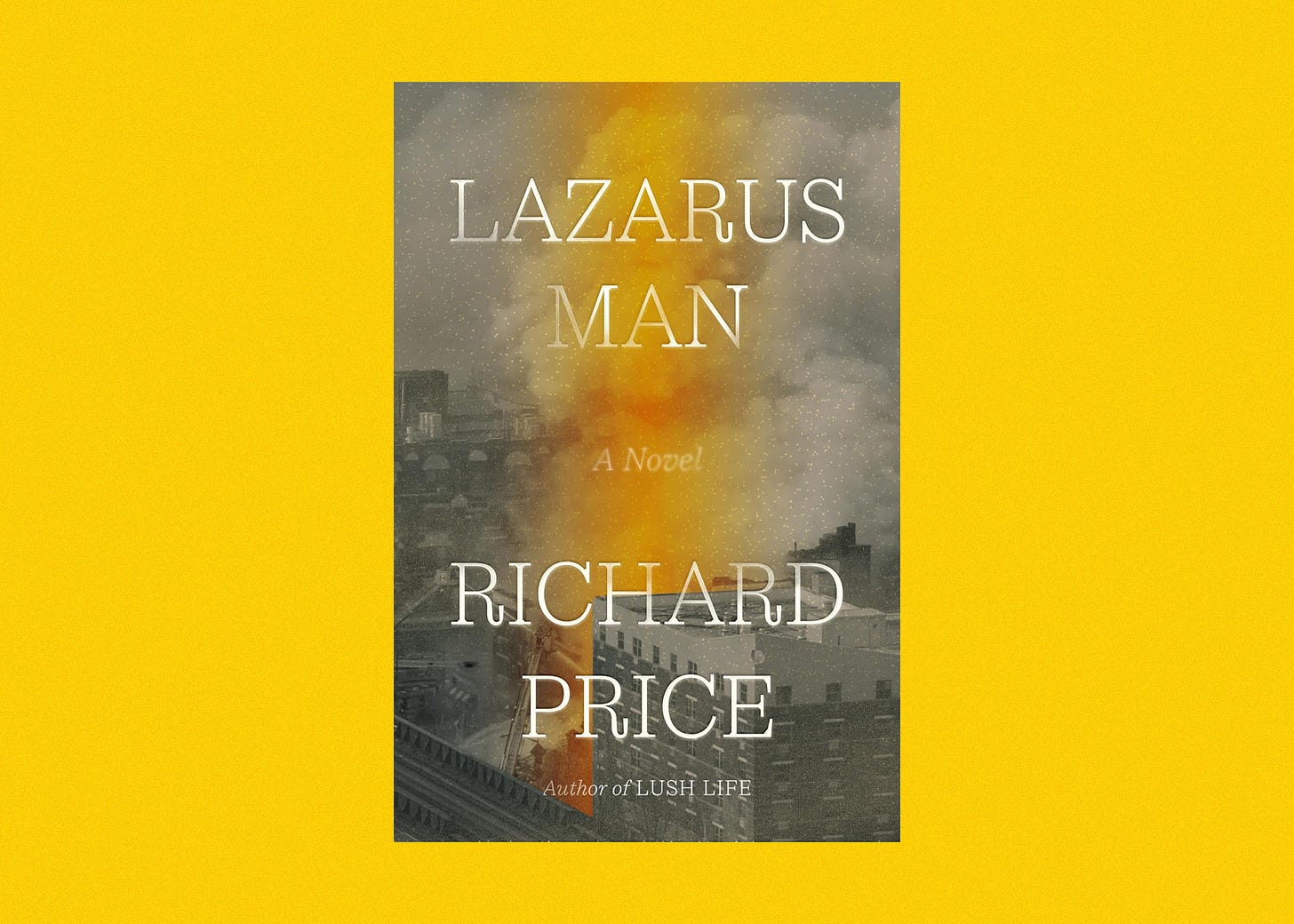Lazarus Man
A Novel
by Richard Price
Farrar, Strauss, and Giroux, 352 pp., $24
RICHARD PRICE’S NINTH NOVEL, The Whites, came out nine years ago. The Whites is a crime novel, and when he began it, Price intended to write a traditional, mainstream crime thriller under the pen name Harry Brandt. He realized when he finished the book that The Whites was just like his other novels, because, as he told Interview, it became “bigger than just the story.” For contractual reasons, the name Harry Brandt remained on the book cover, but so did Price’s own name, because—whatever the initial intentions—The Whites was unmistakably the work of Richard Price.
Because Richard Price is like no one else. First reading Clockers, his mainstream breakout hit (critics got on board with him when his debut novel, The Wanderers, was released in 1974), I was struck mainly by Price’s unparalleled ear for dialogue, as well as his ability to create brief, off-hand moments for his characters, everyday behavior, gestures, and reactions that place his characters firmly, and unmistakably, in the world in which we live, and among the people we know in real life. I remember one moment in that sprawling novel of urban crime, drugs, and police work, where the villain, Rodney, bites into a pickle, and the way Price described Rodney contorting his body to keep the pickle from dripping onto his clothes made me think that yes, he’s right, that’s exactly what people do. This gift, and his effortless command of authentic human speech, are explored further in his new novel, Lazarus Man.
Price is a quintessential New York writer. I make no claims to having any expertise regarding that city, I’ve only been there once, but when I read one of Price’s novels (and I’ve read them all) I feel, more than with any other writer based in New York City, a genuine connection, an understanding, to the extent possible, of what existing there on a daily basis probably feels like. This is because one of Price’s primary concerns as a novelist is the depiction of communities. Not just the community of New York City writ large, but of the smaller, square-block-sized communities that exist within it. In Lazarus Man, Price focuses mainly on a small section of Harlem, a section that encompasses, among other things, a police precinct, a funeral parlor, and a slummy tenement building which, as the novel begins, suddenly collapses, killing six and injuring many others, rendering everyone else who lived there homeless, and turning one man, a jobless ex-cocaine addict named Anthony Carter, into a local hero.
Carter was pulled from the rubble of the building by emergency responders, after having been buried for about 36 hours. Giving much of the credit for his survival to God, Carter becomes somewhat famous after describing his experience on the local news. Soon, he’s being asked to give public speeches, at memorials for members of the community who have died, or in support of social causes, like ending gun violence. This puts Carter on the radar of several people: Felix Pearl, a young white camera enthusiast who picks up freelance gigs filming public events, weddings, and funerals, who was present at the site of the building collapse; Royal Davis, a struggling funeral director who picks up some work as a result of the tragedy; and Mary Roe, a police detective, who finds herself both inspired and strangely suspicious of Carter, while trying to track down Christopher Diaz, a man who lived in the collapsed building, and who is now missing.
DIAZ’S WIFE WAS KILLED in the collapse, and the key, I think, to Lazarus Man’s success can be found in the way Price writes about this aspect, and Roe’s feelings about it, and her job. At one point, Roe is watching a security video that shows Rosa Diaz withdrawing money on the day she died:
That was always the thing that got to Mary, watching people who had died, still alive on some recording device going about their day, oblivious to their impending doom. It smacked of cosmic unfairness, making even the worst players seem painfully innocent.
There are no villains in Lazarus Man, but there are characters whose ethics and interpersonal behavior are less rigorously examined than we might wish. Yet Price understands everyone, respects everyone, is not interested in diminishing them, or depicting them as easy targets to be knocked down. Lazarus Man is a hard-bitten novel, but Price has such empathy for the suffering and grief that we all experience at one time or another—he describes several people, relatives whose loved one has just died, as “sitting on a couch and staring at air”—that there is a hopefulness to it that seems honest. The novel is almost agonizingly sincere.
Price builds this emotional weight, and connects the reader to his characters, through all the small moments he adds, moments that would considered unacceptably irrelevant, and therefore useless, by most writers. In addition to his novels, Price is also a well-known screenwriter (The Color of Money, Sea of Love, The Wire), and Lazarus Man has a very cinematic style: Price “cuts” back and forth between scenes of varying length, some quite short, that depict his characters doing something either important to the story, or entirely unimportant. There are complications in everyone’s life, outside of the main plot: Mary Roe is carrying out a casual, but somewhat frustrating affair, with another cop; Royal, the funeral director, hates his job. Felix finds himself being scammed, twice, by a local girl he doesn’t even know. All she is—the very important thing that she is—is someone Felix meets.
It’s because Price understands these small moments are what make up a life, that they carry just as much weight as the big moments, that Price is so good at writing dialogue. If written to approximate actual human speech (which dialogue isn’t required to do), it describes, without actually describing it, a thought pattern. So when somebody stutters, or repeats themselves, or stumbles over words, as they often do in Price’s novels, we are stepping into their heads, tracking what they’re saying versus what they’d rather keep to themselves. Late in Lazarus Man, Anthony Carter receives a phone call from his stepdaughter Willa; he’s separated from his wife, her mother, and feels severe guilt about not keeping better contact with the young girl. Willa calls asking for money. Carter asks her what it’s for. Willa says:
“Atlas has a tumor in his leg, Mom says he’s old and we should just put him out of his misery but it’s my dog not hers and the vet says she can amputate and he can live another two years.”
It all sounded rehearsed or memorized, which left Anthony berating himself: This stranger is what you get for bailing on her, this stranger is what you deserve.
“I don’t want to go behind your mother’s back. Can I talk to her about this?”
“No. Don’t.”
“Ok. Can I talk to the vet?”
“Why? I’m telling you everything.”
“It’s just . . . Ok, how about this. Give me the vet’s contact information and I’ll send the money to her directly.”
. . .
“I thought you loved me,” was all she could come up with.
A more complicated issue arises when Price writes the inspiring public speeches that Carter makes. His near-death experience has changed him. Previously the kind of person who might be labeled a loser, Carter has become a man with a purpose, a belief that his words about pain, God, and life can help those who are suffering, in the aftermath of the building collapse, or for any other reason. Near the end of Lazarus Man, Carter gives a speech at an event to benefit the survivors of the collapse. During the speech, Carter says:
Pain is the chisel with which He, with which we, sculpt our own character. Pain, that unexpected Kick in the teeth is the scalpel, the forge, the furnace, the lion’s den, and how we respond to it makes us who we are.
The complication is that much of what Carter says to the public can be read as empty and platitudinous. And in fact, it is. The New York Times review of Lazarus Man was particularly troubled by this. But Price knows that Carter’s words are old, unoriginal, artless. Though Carter can’t define the change in himself, or explain it beyond the notion that God has a job for him to do, he does understand that the quality of his words is debatable. And he’s not the only one. Earlier in the novel, Carter tells a crowd of struggling New Yorkers that the worst thing that has ever happened to them, whatever that might be for each individual, will ultimately of great benefit, that it will, in fact, be “the best thing that could possibly happen to you.” Felix, who hears that speech, regards that idea as “horseshit.” And a woman who lost her husband in the collapse confronts Carter, telling him what happened to her husband and of all the hardships his death will now force her and her children to face, asking him, “How is all what I just told you going to turn out to be the best thing that could ever happen to me?” After a bit, Carter begins to respond: “Maybe God . . .” He stops, and the woman says “Maybe God what?” Then:
“I don’t know.” His voice down to a hush, then half-heartedly added, “Nobody knows. It happens when it happens. I guess you just have to believe that it will.” Hearing himself, a preening fraud, a self-aggrandizing con man.
But Price understands something else, which is that simple words, simple sentiments of hope, are often what help someone who is grieving, or suffering in some way. Human beings cling to whatever will give them a modicum of hope. Price isn’t interested in depicting people as they are not. He knows what people find most meaningful, what people need, or just believe they need. He’s also not interested in looking down on anyone for what they cling to, because artless, old, hackneyed though the words might be, maybe they’re on to something. Or maybe Lazarus Man is a little too humane for its own good.






